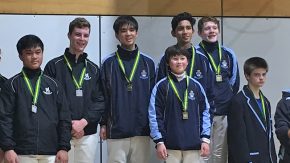WONTOK Conference
On 2 June, fifteen Newington boys travelled to Roseville College for the annual WONTOK conference. ‘WONTOK’ stands for ‘one community’. In joint force with two other schools, we discussed global problems the world now faces. The WONTOK organisers placed particular emphasis on the Sustainable Development Goals (SDG); a list of seventeen long term objectives put forward by the United Nations.
The first task of the day was to choose a particular goal that interested us the most. I decided to choose the goal addressing sustainable cities and communities, as I deemed this to be highly important in a world so dependent on finite resources. There were very many other goals that were to be discussed, as seen in the image below.
At the start of the day, we were introduced to Roxanne, an Anglicare worker from Papua New Guinea, who told us some stories about the struggles her people have faced. She discussed the various goals of Anglicare in PNG, linking them to the SDGs.
Papua New Guinea is a nation suffering from poverty, a lack of education, hunger, domestic violence and a lack of good health and sanitation. Clearly, there are some huge issues there that need to be addressed to improve the quality of life for everyone. Roxanne and her team of workers provide many services to help combat the challenges, including literacy programs, domestic violence programs and family support networks. She was truly inspiring and her presence really made the event more impacting, which highlighted the importance of her cause.
During the day, we were split into mixed groups of different ages and different schools. My group’s first activity involved the production of paper bags out of newspaper. We were divided into four groups and were told that we needed to make batches of five bags to sell to a depot. With this money we were going to make from this, we were required to raise 1000 rupees to pay for rent and 1000 rupees for food, to sustain our family. Frantically, we got to work, making bags as quickly as possible. In our first “week”, we fell short of our goal by 300 rupees. Due to this, one of our team members was deemed inactive, due to the effects of starvation. We started week two with some remaining paper bags from the first week, and managed to make our goal of 2000 rupees, with 400 to spare.
This exercise was quite effective in demonstrating how hard it was for impoverished people to gain money, especially in a large family with children who worked very long weeks, yet gained very little money in return (remember 2000 rupees = $41). We were confronted with their problems on a much smaller scale which in turn highlighted the harsh conditions they live in. Due to this, many children miss out on a childhood and education due to the need to help their family make enough money to survive. This is a sad and harsh reality that needs to be urgently addressed.
Our next activity focussed on disease. We essentially played a large scale version of the board game ‘Pandemic’, based in Australia. Our goal was to eradicate a given disease as quickly as possible. This activity demonstrated the importance of good health and sanitation, which are two of the SDGs. Luckily, our group managed to eradicate the said disease and save Australia. The game really showed how complicated it was to destroy a disease due to wide spread Globalisation, relating to the recent Ebola outbreaks in Africa. The instructor also made the point that as soon as cases were detected in America and Europe, more effort was placed into finding a vaccination for the disease. This raised some equality issues and is again another matter that needs to be discussed more on the global stage.
The third activity of the day was a mock trial of four innocent people who had been detained for being near a riot. This problem was set in Haiti and focussed on unjust organisations and governments. It was extremely hard for us to defend the innocent convicted people, as the judge and police were corrupt and wouldn’t acknowledge the defence we put forward. The frustration we experienced was very real which demonstrated to us how hard it was to fight for the rights of people who live under the jurisdiction of unjust governments.
The fourth and final activity focussed on the 13th SDG; Climate Action. We talked about global warming and how we could stop it from occurring. We discussed renewable energy then focussed on a less familiar problem; climate refugees. We discussed how villages and communities are facing severe drought and adverse weather. The sad truth is that we have had so much opportunity to help improve our climate, but have taken little action. This is another issue that needs to be addressed by every society and community. It is good to see that there are now conferences being held to discuss climate change, such as the 2015 United Nations Climate Change Summit held in Paris.
In all, the WONTOK conference was a worthwhile experience for those involved. Everyone seemed to take away thought-provoking ideas to help improve our world. I’m glad we could participate in a conference of this calibre, whose agenda is one that promotes peace in a sustainable world.
Dale Schlaphoff (11/FL)







